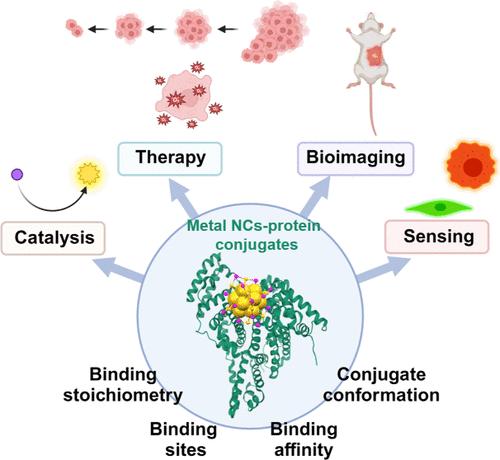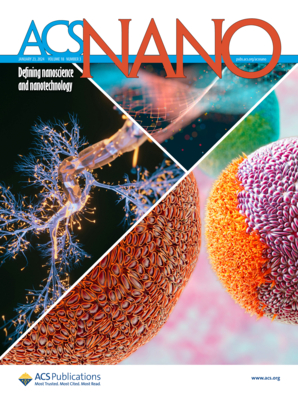Precision Metal Nanoclusters Meet Proteins: Crafting Next-Gen Hybrid Materials
IF 15.8
1区 材料科学
Q1 CHEMISTRY, MULTIDISCIPLINARY
引用次数: 0
Abstract
Metal nanoclusters (NCs), owing to their atomic precision and unique molecule-like properties, have gained widespread attention for applications ranging from catalysis to bioimaging. In recent years, proteins, with their hierarchical structures and diverse functionalities, have emerged as good candidates for functionalizing metal NCs, rendering metal NC–protein conjugates with combined and even synergistically enhanced properties featured by both components. In this Perspective, we explore key questions regarding why proteins serve as complementary partners for metal NCs, the methodologies available for conjugating proteins with metal NCs, and the characterization techniques necessary to elucidate the structures and interactions within this emerging bionano system. We also highlight the emerging applications of metal NC–protein conjugates in biomedicine, catalysis, and biosensing in which the hybrid conjugates demonstrate remarkable performance. Furthermore, key challenges hampering further development of metal NC–protein conjugates, which include understanding binding mechanisms, expanding the diversity of proteins used for conjugation, and exploiting the individual roles of metal NCs and proteins within the hybrid systems, are discussed. This Perspective aims to systemize current synthetic methodologies and design principles for metal NC–protein conjugates, adding to their acceptance in precision nanotechnology.

求助全文
约1分钟内获得全文
求助全文
来源期刊

ACS Nano
工程技术-材料科学:综合
CiteScore
26.00
自引率
4.10%
发文量
1627
审稿时长
1.7 months
期刊介绍:
ACS Nano, published monthly, serves as an international forum for comprehensive articles on nanoscience and nanotechnology research at the intersections of chemistry, biology, materials science, physics, and engineering. The journal fosters communication among scientists in these communities, facilitating collaboration, new research opportunities, and advancements through discoveries. ACS Nano covers synthesis, assembly, characterization, theory, and simulation of nanostructures, nanobiotechnology, nanofabrication, methods and tools for nanoscience and nanotechnology, and self- and directed-assembly. Alongside original research articles, it offers thorough reviews, perspectives on cutting-edge research, and discussions envisioning the future of nanoscience and nanotechnology.
 求助内容:
求助内容: 应助结果提醒方式:
应助结果提醒方式:


